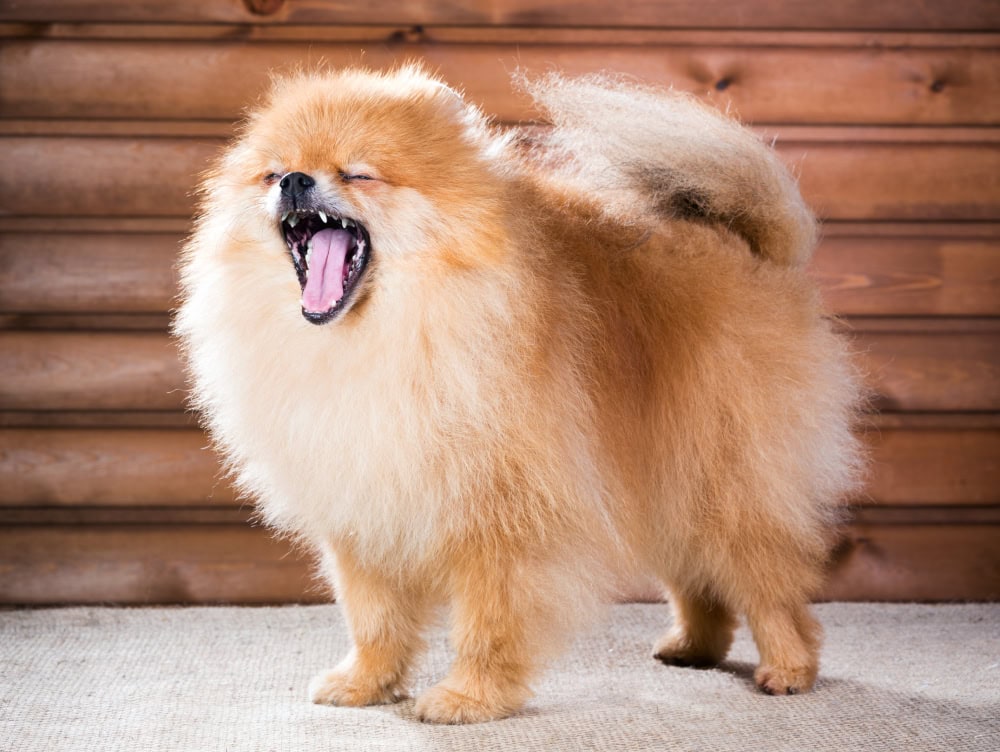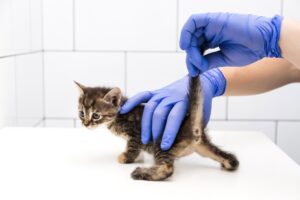VET APPROVED

The information is current and up-to-date in accordance with the latest veterinarian research.
Learn more »Pomeranians are small yet hardy dogs with outgoing and sociable personalities. Like some other breeds, they do suffer with their fair share of common illnesses, including eye problems, dental disease and hip dysplasia. Like other dogs, they can also suffer with illnesses that can lead to coughing.
There are several reasons that your Pomeranian might be coughing so much, and we will outline some of them here. One or more of the following causes may apply to your beloved pup.

The 7 Reasons Why Your Pomeranian Is Coughing So Much
1. Kennel Cough
Kennel cough is the common name given to infectious bronchitis in dogs. It is highly contagious between dogs and is usually caused by a combination of virus and bacteria. The infection affects the dog’s respiratory system, causing a hacking cough and sometimes a high temperature.
This disease is named as such because it’s commonly found in places where many dogs congregate, like kennels. If a dog is stressed, its immune system may be suppressed slightly, which allows the infection to take hold.
For fit and healthy dogs, kennel cough is usually self-limiting, and your dog will recover over about 3 weeks. However, in very young or very old dogs, or those suffering with other diseases, it can progress to pneumonia and become more serious.
If your Pomeranian is coughing, it is best to call the vet for advice. If your pup is otherwise well, eating and drinking normally and isn’t showing signs of lethargy, you might be advised to keep them at home, with plenty of fluid, tasty food and TLC. It’s important to keep them quarantined from other dogs while they recover to ensure that they don’t spread the disease. A dehumidifier may be helpful. If the coughing progresses and your dog develops further signs such as lethargy or going off their food, a trip to the veterinarian’s office is in order.
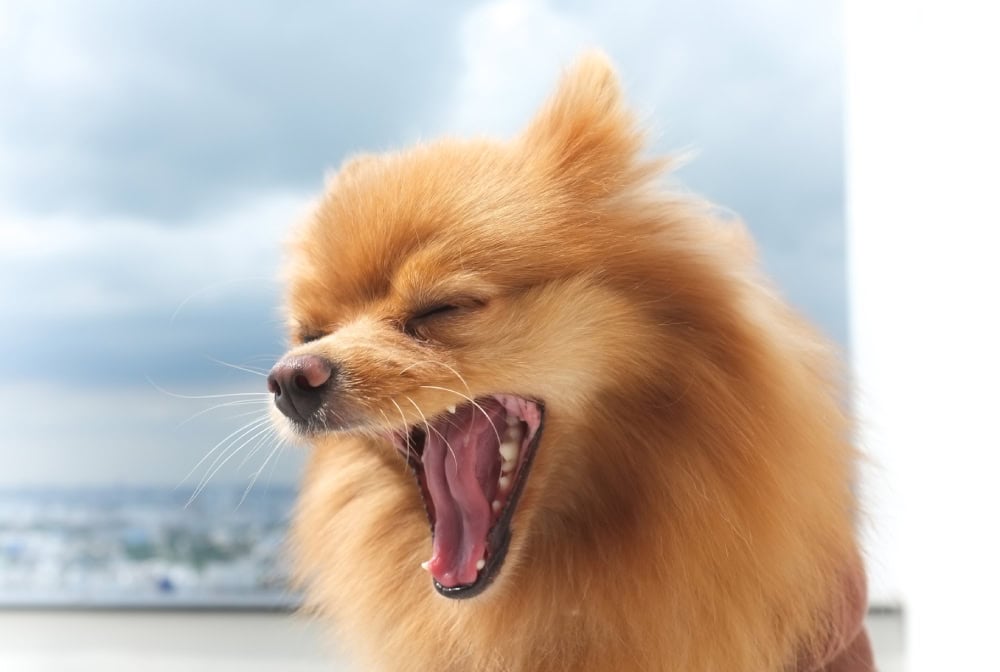
2. Hairballs
Just like cats, Pomeranians can be affected by hairballs. Their long hair is easy for these dogs to lap up when they are grooming themselves. Hairballs are especially common among Pomeranians when they are shedding. If your Pomeranian is suffering from hairballs, they might sound like they are coughing, as they are trying to bring the hairball up, but they are actually vomiting (bringing the hairball up from the stomach).
Typically, hairballs will either get vomited up or they will make their way through the digestive tract and pass out the other end. On occasion, a hairball can become stuck in the gastrointestinal system and create an intestinal blockage, which is an emergency. Signs of a gastrointestinal blockage are vomiting and abdominal pain. In these cases, endoscopy, or more commonly, surgery, is required to remove the blockage. The best thing to do is take steps to avoid hairballs in the first place.
Brush your Pomeranian daily to get rid of any loose hairs mixed into their coat. Make flea treatments a priority; the less irritating your dog’s skin is to them, the less likely they are to lick themselves. Also, ensure your dog gets both physical and mental exercise through the day, as boredom can lead to excessive grooming.
3. Reverse Sneezing
If your Pomeranian sounds like they are snorting and stretching out their neck at the same time, chances are that they are reverse sneezing. This action is caused by a condition called paroxysmal respiration, which is common among some small breeds, such as Pomeranians. It makes a dog quickly draw air in through their nose quickly and repeatedly, making a very strange noise.
Witnessing your Pomeranian reverse sneeze can be alarming — some owners believe that their dog is having a seizure! However, reverse sneezing is not harmful to dogs, and the cause is usually down to soft palate irritation. This can be caused by anything from a blade of grass to household products. There are no side effects to worry about, but if it keeps recurring, you should take your dog for an examination at the vets. The typical reverse sneezing session can last anywhere from just a few seconds to about a minute.

4. Heart Problems
Many heart conditions cause a dog to cough. The most common types of heart problem in Pomeranians include Patent Ductus Arteriosus (a rare defect that some puppies are born with) and valvular disease, most commonly Mitral Valve Disease. When you take your Pom puppy for their first vet check, your vet will carefully listen to your dog’s heart and lungs, and feel their pulses. If they suspect any problem with your dog’s cardiovascular system, they will let you know and run further tests.
In an older dog, degeneration of one or more of the heart valves can cause the heart to beat less efficiently which can result in fluid building up on the lungs. Fluid on the lungs as well as the enlargement of the heart (which occurs as the disease progresses) causes dogs to cough. The cough is usually soft and they may bring up small amounts of fluid with it. If you notice your dog starting to cough and perhaps starting to slow down on walks a little, take them to your vet for a good check over. Old dogs do slow down, but more often than not, there is a good reason for it, and ruling out heart disease early is important so that management can be more successful.
Heartworm is also a problem that all dog breeds are susceptible to, and Pomeranians are no exception. One of the first signs of heartworm infection is a light and dry cough. Heartworm is transmitted from an infected dog to a healthy dog via a mosquito bite. The larval stages of the parasite (microfilariae) then migrate through the tissues, eventually reaching the blood vessels that supply the heart and lungs. Through damaging the blood vessels and causing irritation and inflammation, heartworm can cause severe illness and even death.
5. Trachea Collapse
This progressive disease affects a dog’s trachea or windpipe. Tracheal collapse is most common in small dog breeds like Pomeranians, so all owners should be aware of it and its signs. A tracheal collapse happens when the cartilage rings that maintain the shape of the windpipe start to weaken, so they can no longer hold the windpipe open.
As the windpipe “flattens,” less air can get through, which makes it tough for a dog to breathe. The predominant sign of a trachea collapse is a harsh and persistent cough, often described as a “goose honk.” More severe signs of tracheal collapse are difficulty breathing, fainting, and changing tongue color. If these signs are seen, a trip to the nearest emergency hospital is needed.
Trachea collapse unfortunately can’t be cured, but it can be medically managed in most cases. However, if medical management isn’t working, your vet may advise you that surgery is needed. Medications include cough suppressants, anti anxiety medication, bronchodilators, and corticosteroids. Your veterinarian will determine a treatment course based on your dog’s health and other ailments that they might be dealing with.
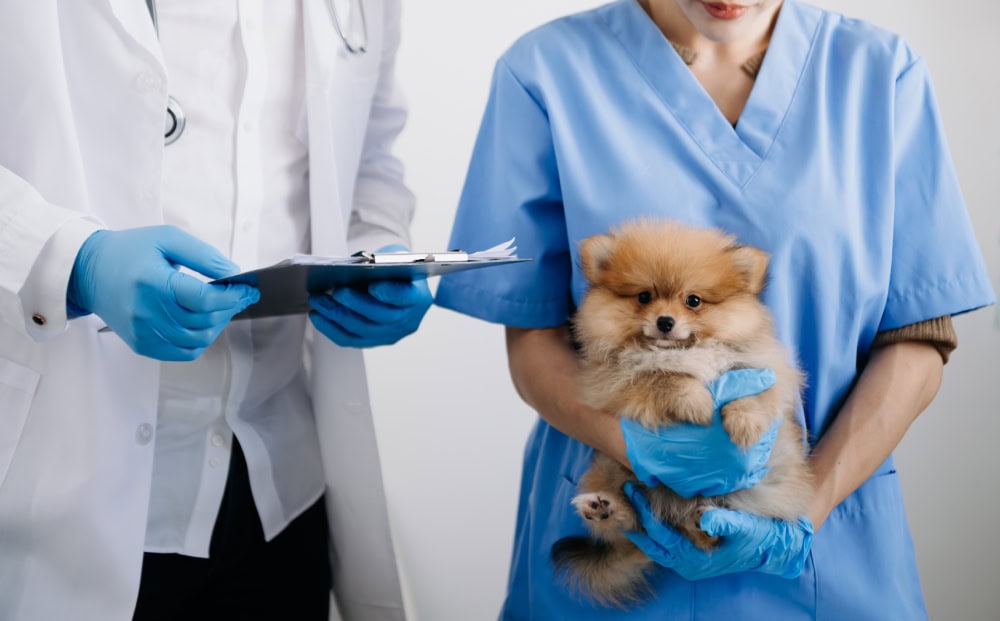
6. Allergies
Have you ever had an allergic reaction that made you sneeze, cough, and/or tear up? If so, you should know that the same thing can happen to your Pomeranian. Dogs can be allergic to various things, just like humans can. If your dog is coughing, think about the allergens in your dog’s environment. These could include things like dust, pollen, cigarette smoke and dander from other animals.
If you suspect your dog is coughing due to something like a new air freshener, try to remove that from the environment and assess how your dog is. If it doesn’t improve over the course of a day or two, it is best to visit your vet for an examination. If your dog is unwell in any other way, see your vet more urgently.
7. Canine Influenza Virus
Canine influenza, or “dog flu” can infect dogs of all breeds. It’s similar to the flu that humans experience, but the virus that causes it has not been shown to affect humans in any way. However, it is extremely contagious among canines.
There are two canine influenza viruses to be aware of: H3N2 and H3N8. Dogs generally recover well from both types of virus, though in severe and very rare cases, the virus can lead to pneumonia which is much more serious. Signs of canine influenza include coughing, fever, runny nose, eye discharge, a lack of appetite, and lethargy.
Fortunately, you can get your dog vaccinated against both strains of canine influenza viruses, which should minimize their risk of getting ill if they are exposed. If your dog does get sick, treatment typically consists of plenty of rest and hydration. Their immune system should take over the job of fighting off the virus, as long as they are otherwise healthy. If your dog is very old, very young or is immuno-compromised, you should see your vet as soon as you suspect they may be unwell.
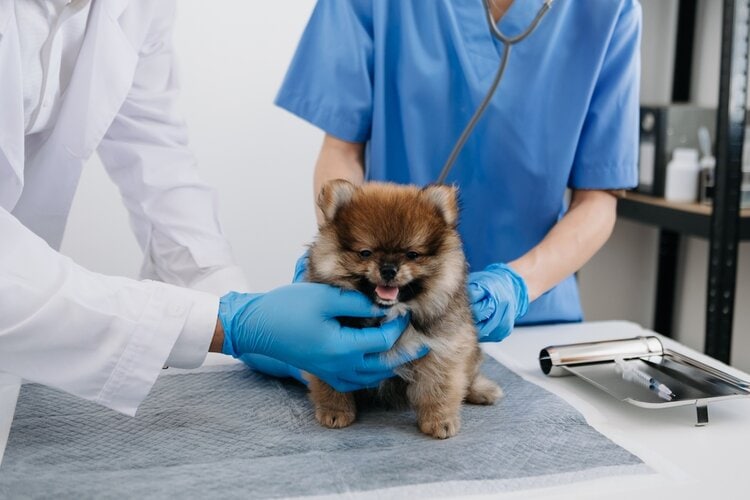

Conclusion
While the occasional cough should be expected from your dog, there is nothing normal about a cough that doesn’t seem to cease. Hopefully, one of the causes outlined here will help you determine why your Pomeranian is coughing so much, so you can figure out how to address the problem. With any luck, your dog will be free of their cough in no time.
- Kennel Cough in Dogs: Causes, Symptoms, and Treatment | PetMD
- Dog Flu (Canine Influenza) in Dogs | PetMD
- Pomeranian | Central Texas Veterinary Specialty & Emergency Hospital
- https://www.vet.cornell.edu/departments-centers-and-institutes/riney-canine-health-center/health-info/tracheal-collapse
- https://www.petmd.com/dog/general-health/reverse-sneezing-in-dogs
- https://vcahospitals.com/know-your-pet/patent-ductus-arteriosus-in-dogs
- https://www.msdvetmanual.com/dog-owners/heart-and-blood-vessel-disorders-of-dogs/heartworm-disease-in-dogs
Featured Image Credit: Sergey Lavrentev, Shutterstock

